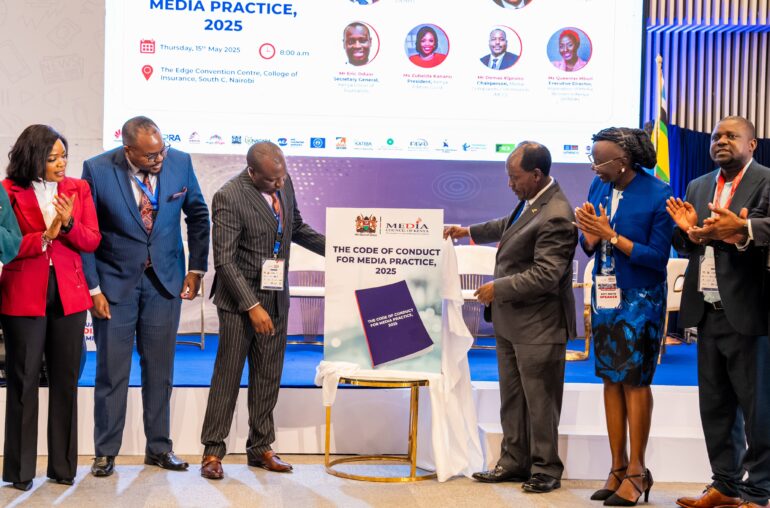The Media Council of Kenya (MCK) has unveiled the updated Code of Conduct for Media Practice 2025, marking a significant move towards enhancing ethical journalism in the digital age. The revision aims to address contemporary media challenges and safeguard public interest, especially amid rising concerns around misinformation, harmful content, and the impact of emerging technologies.
The Code was officially launched by Hon. William Kabogo, Cabinet Secretary for Information, Communications, and the Digital Economy, during the Annual Media Summit held at Nairobi’s Edge Convention Centre.
He emphasized the critical role of truth and accuracy in news reporting, particularly in an era where speed often overtakes verification.
“We call on the media to remain fair, objective, and accurate. In a digital world, speed must never come at the cost of truth. Responsible journalism is the backbone of democracy,” Kabogo stated, while also referencing Kenya’s ongoing efforts to finalize a national digital policy and expand investment in digital literacy and infrastructure particularly to empower local and community media outlets.
The revision of the Code was necessitated by both the shortcomings of its previous version and a High Court ruling that declared sections of the existing Broadcasting Code unconstitutional. The court had directed the MCK to revise the framework and include clear, age-appropriate content guidelines within six months to better protect children and other vulnerable groups.
MCK CEO David Omwoyo commended the updated Code, describing it as a timely and robust response to the complexities of modern journalism. “The new Code is a comprehensive guide that prioritizes the protection of children, survivors of sexual abuse, and vulnerable populations. It also offers guidelines on handling user-generated content, artificial intelligence, gaming, betting, and lottery-related content,” said Omwoyo. “It’s a crucial step toward maintaining ethical standards in an increasingly dynamic media landscape.”
The revised Code also takes a firm stance against hate speech, incitement based on religion or ethnicity, and other forms of harmful content. It calls on not only traditional journalists but also bloggers, editors, and digital influencers to uphold credibility and accountability.
This reform signals Kenya’s commitment to fostering a responsible and professional media ecosystem one that promotes national values, upholds public trust, and protects the democratic space without compromising press freedom.
